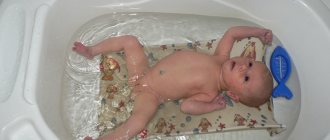Objective reasons
In addition, there are not mystical, but very real reasons why children under one year old can be protected from unnecessary contact with others: some parents are afraid of scaring the child with invasions of a noisy crowd or camera flashes, others are afraid of infections.
Indeed, children do not develop immunity immediately, so they are not as protected from all sorts of viruses and bacteria as adults. And in close contact with strangers, the child can become infected with something. Therefore, it is not advisable to organize a pilgrimage in the apartment for relatives and friends who have come to look at the newborn. True, it will still not be possible to isolate the child: after all, he will have to be taken for walks, to the clinic, etc. And, probably, you shouldn’t protect your baby from the world too carefully: you still need his body to learn to adapt to the environment and begin to develop a protective system. Don't kiss him on the lips, you can't! Do you need to go to the clinic? You need to attach a pin to the vest with the head down, otherwise they will jinx it! Don't stand in front of the mirror with him, you can't! Such and many other pieces of advice pour in from all sides to a young mother regarding her newborn child, leading to complete confusion. How many days after birth can you show your baby?
Physiological jaundice
A few hours after birth, the baby's skin may take on a yellow tint. This problem is physiological and is associated with the breakdown of bilirubin. This pathology worries many babies. In this case, not only the child’s skin turns yellow, but also the sclera of the eyes. Bilirubin must be actively removed by the liver, but its enzymes are not yet completely perfect. Therefore, fetal hemoglobin accumulates in the blood, which causes yellowness of the skin.
As all organs of the newborn mature, bilirubin begins to be actively excreted. Therefore, within 1-2 weeks the problem disappears. However, sometimes drug and physiological treatment is required. In this case, doctors can prescribe:
- UV irradiation;
- administration of glucose;
- choleretic drugs.
This condition cannot be ignored, because excess bilirubin causes severe intoxication and causes great harm to the small organism.
What does Orthodox Christianity say?
Many believe that the ban on showing a child 40 days after birth is in the traditions of Orthodox Christianity. But the priests shrug their shoulders when they hear such a statement. Then why is there such an opinion?
Previously, there was a custom to baptize a child on the 40th day after birth. During this time, the woman is considered “unclean”, desecrating the temple with bleeding, and she is forbidden to go further than the vestibule of the church. Even a priest with a bleeding wound is not allowed to serve, because by definition, the offering of the bloodless sacrifice of Christ, carried out at the Eucharist, should not contain any blood in the Temple of God.
Naturally, in the postpartum period, with bloody discharge, a woman could not be present at the baptism of her child, and this period was delayed until it completely stopped. In general, the Orthodox Church does not establish specific dates for the baptism of a newborn child.
The sacrament can be performed at least the next day after birth at the request of the parents. Having dealt with the figure of 40 days, then the superstition begins about the lack of angelic protection in an unbaptized baby and defenselessness from all sorts of evil eyes and damage.
A little more belief
There are also such beliefs:
- To prevent the newborn from being jinxed, somewhere on his clothes you need to attach a pin with the head down;
- You can’t put the baby on the table - it will take a long time to learn to walk;
- Until the baby is 1 year old, it is forbidden to feed the baby mushrooms and fish - he will be as dumb as a fish;
- As soon as the baby takes the first step, you need to cut the invisible bonds with a knife - the baby will learn to walk faster and will stand firmly on his feet.
At first glance, some are akin to complete superstition, while others encourage the desire to discover hidden meaning. The ban on showing the baby for the first 40 days after birth is such a belief.
It is known that general practitioners, perinatologists, and lactation consultants ask parents not to rush into receiving guests for the first 40 days. Religion also insists on this. After all, a baby up to 40 days of life still does not have protection from the negative forces surrounding him.
Superstition concerns not only the close contact of a baby and a person, but also his photo. Therefore, many priests do not even recommend taking photographs of the baby during the postpartum period, let alone showing the pictures.
Ancient thought
Now let's remember the more ancient idea about the first 40 days. After all, the roots of this superstition go back to paganism. In accordance with old beliefs, our world is divided into two zones: the world of the deceased (dead souls) and the world of the living. In these two worlds, everything is the same, but there is one mirror difference: 40 days is the period of the deceased’s journey to the world of dead souls.
Accordingly, 40 days in the world of the living is the acceptance of the baby into the world of life. In the pagan era, special rituals were performed to help the soul cross safely into another world. It was during these 40 days that people tried to protect the baby as much as possible from the evil eye. Today this ceremony of help has been erased from our memory, but the very belief about 40 days of untouchability remains.
An overexcited and tired baby will not be able to fall asleep for a long time. And having fallen asleep, he will often wake up at night and shudder. What can we say about an overworked mother. Due to emotional breakdowns, not only neuralgia may occur, but milk may also disappear.
Therefore, openly announce to everyone who wants to see the baby that they will be able to visit mother and baby only in two months.
Benefits of superstition
Despite the fact that parents independently decide when to show a newborn, there are still important points in the ancient belief that should not be missed.
Remember that only the mother herself should decide how to care for her baby. And at the moment she does not need advice on what and how to do. Except when she herself asks you to suggest something.
Constant interference in the process of raising and caring for a child can seriously undermine the psycho-emotional state of the mother. And a woman who has recently given birth should not experience stress and negative emotions.
What you should avoid in the first months of your baby’s life:
- Noisy companies should not be allowed in the house.
- Do not allow children to visit your baby. Most kindergarten-aged children get sick regularly. This means they are potentially dangerous for your baby.
- Do not allow the baby to be passed from hand to hand to close relatives.
- Learn to refuse any attempts to force yourself on a visit. Don't be afraid to offend anyone. They themselves must understand that receiving guests is a serious burden for a young mother, both emotional and physical. After all, her main task for this period is caring for the baby, and not organizing leisure time and tea parties for guests.
- Avoid quarrels and loud conversations in front of your baby.
- Avoid long conversations on the phone.
- Do not trust your child’s life to a nanny in the early stages.
Safe first encounter with a newborn
A new question arises: when can you show your newborn to family and friends? At first glance, the answer is simple: after 40 days. On the one hand, this is true, on the other hand, you need to take all the necessary measures for the comfortable conduct of the first screenings:
- No more than 10–15 people should be invited to the first viewing of a newborn. It is better if these are relatives and close friends;
- Organize the whole process correctly, choose a room or place in nature. If you invite guests to your home, try to think in advance about the placement of guests, and also create a quiet corner for mother and newborn;
- Try to ask those invited in advance not to come if you have any ailments. Despite the 40-day stage, the child is still weak and any virus can negatively affect his health;
- For mother and newborn, it will be difficult to go out to meet each guest; it is better if all the invitees gather in one room, and mother and child come out to them for a few minutes;
- After all the guests have left, pay more attention to the newborn: prepare him a bath with herbs (Read the article, herbs for bathing a newborn >>>), give him a soothing massage, feed him and put him to bed. The child must understand that it was an ordinary day and he is not in danger. Therefore, let your loved ones take care of cleaning and seeing off guests.
Very often, invited guests ask to suggest what they can give to a newborn for his first holiday. Therefore, try to plan in advance who will give what.
The safest option is size 2 and 3 diapers. Do not order 1 as your child is growing quickly and there is a chance they will become too small for him quickly. What toys does a 1 month old baby need>>>
Having considered the various views on the 40 days superstition, we can confidently say that sometimes a simple superstition carries a deeper meaning. And if you adhere to some long-established truths, every mother will be able to go through the stage of harmonious acquaintance with the newborn, without being distracted by external fuss.
After all, a little person born is truly a miracle, so fragile, but so dear and beloved.
- How to clean a newborn's nose?
- First aid kit for newborns
- How to clean newborns' ears?
to protect the baby from allergies, colic and abdominal pain.Nutrition GUIDE for a nursing motherClick and get
Features of the fourth month of life
At four months after birth, two naps are established. The daily regimen includes about 6 feedings. The child's first attempts to sit independently appear. By the end of the month he can sit with support. When a baby is held by the hands, he can confidently put his feet up and step over them. Begins to learn to roll over from back to tummy.
While playing, he examines and feels toys. At four months, a child begins to distinguish colors and shapes of objects. Activities with your baby can be done using musical toys. We offer paper that can be torn or kneaded (development of fine motor skills).
Why can't newborns be shown until 40 days?
Is it possible to show a newborn up to 40 days? In the folklore of any nation you can find proverbs, sayings and signs that originated in ancient times. Many, claiming that these are just ridiculous superstitions, do not even realize that there is some truth in everything, and in the modern world there are quite weighty arguments to confirm such statements. For example, why can’t a newborn be shown until 40 days?
Mysterious number 40
In the Bible, the number 40 symbolizes completeness and completeness. For example, Noah opened the window on the ark only after 40 days of the flood; the Jews wandered through the desert for 40 days; this number plays an important role in the life of the prophet Moses; The resurrected Jesus spent 40 days on earth before his ascension.
In numerology, 40 symbolizes harmony, balance, the threshold between states of consciousness.
Some sources say that the number 40 carries negative energy: 40 days after death, a person’s soul still wanders the earth. 40 years in Ancient Greece meant that a person had already crossed the threshold that leads to old age and death.
How do priests explain the sign, why it is impossible to show a newborn before 40 days? They say the baby is still too weak and vulnerable. Therefore, negative energy will be easily attracted to it. It is worth noting that our Christian ancestors did not perceive a baby who was not yet 40 days old as a full-fledged member of the family. After this time had expired, the child was baptized, he acquired his own guardian angel, who protected him from evil spirits. It turns out that you cannot show a newborn before 40 days, since there is still no one to protect him spiritually.
Doctors' view of this belief
Few doctors really believe in such signs and evil eyes. Medical professionals are able to immediately dispel any thoughts about the presence of mysticism. In the language of medicine, the mystical phrase “You cannot show a newborn before 40 days” takes on a real and common sense: “The child should not be shown in the first days of life, because he can easily catch an infection.” The body of a newborn baby is very weakened and not adapted to the environment. It is also necessary to take into account that most infections are transmitted through the air. That is, the more people are around the baby, the more viruses surround him.
It is best to refrain from showing the child to everyone you know, but to limit your social circle to close relatives, grandparents, sisters, and brothers.
Explanation of psychologists
How long should you not show a newborn? It is also necessary to take into account the psychological data of the child’s development. The baby who came into this world is just beginning to adapt
For him everything is new and unknown. By the age of 1 month, a child’s vision develops, he does not distinguish colors, and it is difficult for him to distinguish voices. Therefore, you should not create stressful situations for the baby. This may affect his further development.
What if meeting new people causes the child to panic, and after that he will become withdrawn? For the development of the baby, it is necessary to provide comfortable conditions.
Previously, the Slavs generally believed that a newly born child had not yet fully come into our world. Part of him lived in the world of spirits, and therefore it was forbidden to disturb him.
To believe in all these beliefs, evil eyes, or adhere to a medical opinion is a purely individual matter. But only one thing is clear - it is advisable to limit the social circle of a newborn child in order to protect him from infections or from evil spirits. Parents must decide for themselves whether it is possible or not to show the newborn up to 40 days.
Popular beliefs
What the legends of Russian antiquity say about the newborn belongs to the realm of superstition, both from a scientific point of view and from an official religious one. Superstition is a prejudice originating in paganism, based on belief in otherworldly supernatural forces and their influence on humans, as well as belief in omens of future events. Or, as the famous writer Maxim Gorky put it, superstitions are fragments of old truths.
Here are just a few of them concerning the newborn:
- A newborn should not be carried through a mirror, because it can be jinxed, causing childhood illness (rickets) and even death. If you kiss a child on the lips, he will be mute. When a weak child is born, he must be baptized, and at the same time, the baby’s baptismal shirt must be worn by all subsequent children so that they do not quarrel with each other and love each other.
- You cannot breastfeed or bathe in front of strangers - they will jinx you. If you smear lard on a newborn, he will have good luck. When you rock an empty cradle (read in a modern way: crib, stroller), you can attract quick death.
Many of these beliefs only make you smile. Arguing in this way, the evil eye can include any state of poor health, which, with today's development of medicine, is quite possible to explain from a scientific point of view without the intervention of supernatural forces.
But the scientific world still agrees with the validity of some “relics of antiquity.” For example, with a ban on showing a child until 40 days after birth. Why can’t it be shown from the perspective of pagan beliefs?
Read also:
The occurrence of postpartum depression
A newborn child is defenseless against people who are carriers of various - good and evil invisible forces. And a person who looks at a child can, even without knowing it, cast the evil eye and cause damage. Only 40 days after birth, when, according to established tradition, the babies were baptized into the Orthodox faith, it was possible to organize a viewing. During the sacrament of baptism, the child is given a Guardian Angel, who protects him from the influence of all evil spirits.
We are going to visit a newborn - rules for guests and signs
Has the gift already been purchased and there are only a few days left before the viewing? So, it’s time to remember the rules for guests...
- Should I take my children with me? Definitely not. Younger schoolchildren and kindergarteners are more likely than others to suffer from diseases that can become very dangerous for an infant. Children are not taken with them to a newborn baby.
- Make sure you are healthy. Even if you have a “slightly runny nose” or “ate something wrong” the day before, this is a reason to reschedule your visit. Especially if the show falls during the ARVI season. If your child is in quarantine at school (kindergarten), this is also a reason to postpone the visit.
- Arrange your visit in advance. No sudden visits like “we were passing by” - only in agreement with the mother.
- Don't overstay your welcome. It will be awkward for a new mother to tell you it's time. Therefore, be prudent: look at the baby, congratulate him, drink tea and... go home. Mom has too many worries right now to have tea with you until the evening.
- Offer your help. Maybe a young mother needs help around the house - for example, running to the pharmacy, preparing dinner, or even ironing things.
- When you enter the apartment, wash your hands immediately. Regardless of whether they will let you hold the baby or not. Hygiene comes first.
- Dress code. It is not recommended to wear clothes made of wool or fleecy fabric - pathogens of infectious diseases are often retained in them in dust or dirt particles between the fibers. If you have the honor of holding a baby, then take him in a diaper - no contact of your clothes or hands with the baby’s skin.
- Is it possible to take photographs? Well, of course you can - where would we be without these first photographs of the baby? But only with mom’s permission (in case she’s superstitious). And without a flash, it is harmful to the child’s eyes.
- Decided to grab food for the celebration? Discuss this issue with your mother. Firstly, she can’t do everything right now (there’s no need to test her strength), and secondly, it will be awkward if mom expects to “kick out all the guests in an hour.”
- Be tactful and control your speech and emotions regarding the appearance of the baby and mother. You shouldn’t tell your mother that she has gained terribly, looks “not very good,” and the baby is “ugly, bald and has an irregular skull shape.” Also, you should not give advice, impose your great parental experience and convince of anything. In any case, if you are not asked to do so.
Mystical aspect
Where did the belief come from that newborns should not be photographed and shown to other people? As you understand, it goes back to the distant past. Scientists claim that our ancestors had “mystical thinking,” that is, their whole life was literally permeated with rituals, signs, superstitions and other mandatory instructions, violation of which was punishable by heavenly punishment.
For example, the first 40 days of a child’s life were considered transitional - he is not yet in our world, but no longer in the “other”. It seems like he came... but he could just as easily leave. During this period, the baby was not given a name, was not shown to anyone, and sometimes they did not even tell anyone that the baby was born at all. It was believed that the soul was not yet sufficiently entrenched in the body, so one should not allow the slightest evil influence, an evil eye or a word, because the baby is not yet protected by anything and does not have a heavenly patron. And only on the 40th day was the ritual of “washing hands” performed with the midwife, symbolizing the final transition of mother and baby into our world, the new mother could finally enter the church, and the child was baptized and given a name. That’s it, now the baby is protected, and it’s unlikely that anyone can harm him.
Nowadays, not every woman can stand the custom of staying at home for 40 days. And pediatricians recommend walking with your newborn baby immediately upon arrival from the hospital. And modern medicine is not even in the mood to let go
+ a newborn from our sinful earth in the first month and a half of life. So the mystical component of the custom simply ceased to be a necessity.
Should you believe omens?
Signs appear as a result of observations, and not only church representatives, but also medical workers agree with some of them. The belief that a child should not be shown for 40 days falls into this category. Folk legends protect a newborn from the evil eye and damage. Religion protects the spiritual component. Science and medicine help promote proper physical and mental development.
A newborn requires a certain period of adaptation and mutual acceptance of the world. Whether or not to believe that a newborn should not be shown to strangers is a personal choice. It is worth noting that even during the communist period, when people were condemned even for baptism, they observed the 40-day rule.
From a religious point of view
The number 40 appears several times in the Bible. There are many different important events associated with it:
- Lent lasts 40 days;
- Jesus Christ wandered around the world for 40 days before his ascension;
- For 40 days, the soul of a deceased person wanders in the world of the living, after which it leaves it.
As for a newborn, it is believed that for the first 40 days of life, the baby’s soul belongs to God, and only after this time, the baby must be baptized and given a name. After this, the child has a guardian angel who will protect him throughout his life. It is from this moment that the church allows viewing of the baby.
However, today the baptism of a newborn is allowed to take place at any time the parents wish. Perhaps the belief is outdated?
Conclusion
Taking into account both points of view, we can safely say that the decision or not to show a child up to 40 days to others remains with his parents. However, before introducing your little one to new people, you should carefully weigh the pros and cons.
Religion's opinion
According to beliefs, the world is mirrored and divided into spiritual and material. In forty days the soul moves from the first place of existence to the second and the baby takes life. In pagan times, special rituals were performed to protect babies from the evil eye.
Is it possible to show a newborn before baptism? Once a baby is born, he has no spiritual protection. Religion says that you should not show your baby until 40 days old. This is the time when a child is quickly jinxed if beauty is admired. It is not necessary to wish him something unkind.
Why a newborn cannot be shown 40 days after birth:
- no guardian angel;
- easy to jinx;
- will get sick.
Before 6 weeks, the child must be baptized. He will have godparents, and his soul will take root in his body. The guardian angel takes the baby under protection on the 40th day of life.
The number is quite strong. The global flood lasted for this number of days. The soul wanders for the same amount of time next to the deceased and grows stronger in the body of the baby. The first month is the most important for the family’s adaptation, so they rest more, get used to the new rhythm, and don’t wait for friends for porridge.
When can you show your newborn to relatives?
After giving birth, mothers need time to recover. And the child needs adaptation to new living conditions. He's just getting used to the sounds. His immunity must be strengthened so as not to encounter possible viruses and bacteria at such a young age.
In the first weeks after birth, the baby gets used to the voices of mom and dad. He already remembered their smell. Since the baby’s nervous system is still developing, he has plenty of emotions that he receives from his parents.
Therefore, you should not overload him with new acquaintances, even if these are the closest relatives. If you have the opposite opinion, then try to approach receiving guests wisely.
We invite you to read: Prayer against the evil eye of a newborn
On average, after one or two months, the mother is ready to welcome close relatives into the house.
Therefore, it is recommended to protect the child for the first 3 months. Since they are considered to be the fourth trimester.
There is a belief that a child during this period has weak energetic protection. And he needs exactly these three months to stabilize.
Likely sources of superstition
Every frightening superstition has several simple explanations. Naturally, we can only guess what formed the basis of this or that mystical ritual or superstitious behavior.
So, there are at least three versions of why an infant should not be shown in the mirror.
- Economic. The mirror product was very expensive, so not everyone could buy it. Consequently, the acquired mirror had to be treated with extreme respect. Well, a child, especially a small one, could accidentally break it. That is, babies in the first year of life were not brought to mirrors, in order to avoid, so to speak, wasteful expenses.
- Aesthetic. The manufacturing technology of the first mirrors was not perfect, so people were displayed in it from a rather unusual angle. Small children, seeing something incomprehensible and sometimes even scary in the mirror surface, could really be scared.
- Medical. In the Middle Ages, mirror makers added mercury to the alloy with which they coated the product. This metal is known to have a very negative effect on human health. Perhaps children who constantly hovered near an unusual object could actually be poisoned by mercury fumes, which affected their well-being and further development.
A baby can indeed be harmed by a mirror, but only if it accidentally breaks this fragile object and is injured by fragments flying in different directions. This is the only possible harm to mirror surfaces.
Signs and beliefs
The tradition according to which a newborn should not be shown to the world for 40 days appeared in pagan times. All people at that time believed in the existence of several worlds, and also in the fact that birth is inherently closely related to death. In both cases, the soul is forced to go a long way between worlds and realities, to avoid many dangers. On her way she will meet a variety of entities, in addition, unkind people can additionally prevent the newborn soul from coming into this world. The evil eye, damage - the baby is most open to all this in the first 40 days.
According to some beliefs, it is in the first months that a child’s soul is most receptive to absolutely everything, both good and bad. Bioenergy scientists today share the same opinion. Any word spoken over a baby literally programs his life and destiny. That is why in the first forty days only the closest people should be around the child, immersed exclusively in caring for him.
What is no less interesting is that the same rules apply to gadgets. Several centuries ago it was forbidden to draw such children and photograph them. The soul, which was not yet fully established in the newborn body, could be damaged by such actions. Today, the sign has spread to gadgets: photographs on a smartphone, video communication, there will still be time for all this, but a little later.
Folk signs
The number of popular beliefs about newborns is innumerable, but they all belong to the realm of superstition, regardless of what point of view you look at it from - scientific or religious. Superstition itself means a prejudice that was founded by pagans who believed in the existence of otherworldly forces and their direct influence on human destiny.
The most common folk signs are the following:
- It is forbidden to carry a newborn child near a mirror so that his reflection is reflected in it. It is believed that in this way one can bring upon him a strong evil eye, a terrible illness and even death.
- It is not allowed to kiss the baby on the lips. Legend has it that this can cause muteness (the baby will not speak).
- You should not bathe or breastfeed a newborn in front of strangers - there is a high probability of the evil eye. Sometimes a person can cast the evil eye without even knowing it.
- It is forbidden to rock a cradle, crib, stroller without a baby - this can cause irreparable consequences to him.
- If a newborn is smeared with lard, then good luck will accompany him throughout his life.
Some of the popular beliefs make most new parents just grin. After all, if you think like this, then, in all likelihood, every negative event in the baby’s life will be attributed to the evil eye: tummy ache, colic, nervous disorders, and so on.
However, many moms and dads are still wary of some folk signs, trying in every possible way to observe them. Among these is the topic of today’s article – the ban on showing a newborn up to 40 days.
Psychological point of view
Are you still asking: “Is it possible to show a newborn up to 40 days?” From a psychological perspective, the first 40 days are necessary not only for the baby, but also for his mother. The young parent did a colossal, back-breaking job: she carried the baby inside herself, nourished her with her own flesh for 280 days, gave birth for several hours, feeling the exhausting pain of contractions.
But not all women in labor go through the postpartum period smoothly: hormonal changes, postoperative ruptures, the establishment of the feeding process - all this affects the mother’s state of mind.
Therefore, during the first 40 days after childbirth, extra emotional stress is harmful for a young mother. After all, she not only needs to get used to a lot (feeding the baby, swaddling, bathing, care at night and during the day), but also endure the intricate period of postpartum depression.
You can also add to this that in the first months the baby establishes a relationship with his mother. This is realized through listening to the intonations of the mother’s voice, feeling her touch, and accepting mother’s milk.
The people present will only interfere with the natural process of contact between mother and baby, because they will also need to pay attention
Why can't it be shown?
So why can’t a newborn be shown until 40 days? The birth of a baby turns into his first life test. Adaptation to the outside world is a very complicated process, so it takes a child some time to get used to life outside the mother’s womb.
Of course, a young mother is drawn to show her baby to her family and friends. After all, they had all been waiting for this event together for a long period of time. Nevertheless, both religion and science recommend not to rush and postpone the viewing.
Why can’t you show your baby before 40 days?
A miracle happened - a little man was born! He is still such a defenseless, tender baby. Parents are endlessly happy and are in a hurry to share their happiness with the whole world! Or not? Let's turn to the wisdom of our ancestors and see - an ancient belief says that a newborn should not be shown to strangers, and it is even indicated for how many days. Let's figure out why the child is not shown for 40 days.
What does Orthodoxy say?
The first reason: religious.
A newborn baby is not protected in any way from the effects of surrounding forces. A guardian angel, a protector, appears to a person after baptism. According to Orthodox tradition, a child is baptized exactly on the 40th day (not earlier) from his birth. And from that moment on, the baby is already protected from the evil eye and bad thoughts of people. Moreover, according to legend, you cannot show the child not only in person, but even in photographs. Therefore, previously it was not allowed to photograph children before he was 40 days old.
In general, the number 40 has a certain meaning in the Orthodox spiritual world. For example, from the Bible we know that this is how many days the global flood lasted, and the soul of a deceased person remains on earth for another 40 days. Thus, 40 days is the period that the soul requires to say goodbye to the earthly world when a person passes away; 40 days is the time it takes for a newborn to adapt to the world and receive the necessary protection.
What is medicine talking about?
The second reason explaining why a child cannot be shown before 40 days is medical.
For a baby who has just been born, everything in the world around him is new. And the air, and things, and people. After the mother's womb, he encounters different microbes and begins to adapt to the environment. In order for the addiction to be gradual, it is advisable to limit the number of contacts with different people. After all, the more people, the more viruses. Therefore, in the first days of a baby’s life, the closest family members are enough for calm adaptation.
Those who can be shown a child up to 40 days include, of course, parents, siblings, grandparents, i.e. dearest people.
Now that you know both reasons, you can decide whether you can show your child to strangers before he turns 40 days old.
Returning from the maternity hospital, young parents are left alone with the baby. Caring for such babies requires a certain skill. As a rule, everything comes quite quickly with experience, but doing something for the first time, for example, having your first bath, requires careful preparation.
Such a common problem in newborn babies as heat rash causes considerable discomfort to the little ones, especially on hot summer days. Of course, many mothers are interested in how to get rid of this scourge. Let's look into this issue together.
The first thought of a new mother when she picks up her newborn baby to care for him for the first time is the exciting topic of the navel. Often new parents are very worried about caring for this wound. Let's figure out how to treat a baby's navel.
With the birth of a baby, a young mother simply has an avalanche of questions regarding caring for the baby. If a child is born in the summer, an important point is how to properly dress him for a walk so that the baby does not overheat, but also does not freeze, because his thermoregulation system is still far from perfect.
What Science Says
Why is it scientifically impossible to show a newborn baby immediately after discharge? Much research is currently being conducted in the field of the human microbiome. It is even isolated into a separate, previously unknown organ. The microbiome consists of a quadrillion bacteria, which corresponds to the number of cells in the entire body, and in some people it even exceeds this number tens of times. Each person is a carrier of 1.5-3 kg of microbes!
The first contact with them and their settlement in the newborn’s body begins when the child passes through the mother’s birth canal. Therefore, children born by cesarean section have a slightly increased risk of infectious diseases while still in the hospital.
The microbiome plays a huge role in human life. The bacteria that inhabit the intestines are suppliers of some of the enzymes necessary for digestion, vitamins for the functioning of the entire body, and even show anti-inflammatory properties. With their help, immunity is maintained and metabolism is regulated.
To illustrate the importance of the interaction between bacteria and humans, we present the result obtained during the research. It turns out that the human genome lacks mechanisms for the production of enzymes responsible for the digestion of plant complex carbohydrates
This function is performed by “fermenter” intestinal bacteria, making non-digestible food quite suitable for feeding the human body.
The composition of the microbiome adapts to the place of residence, dietary habits and other conditions surrounding a person. That is, a particular family, house, apartment, yard has its own microbiome, unique only to this habitat. And after birth, the child’s body begins to adapt to the diversity of microflora that surrounds it, that is, to the microorganisms living and present in the father, mother, and home. A unique microbial ecosystem is formed.
Therefore, you cannot interfere when the process of building this system is underway, and show the child after birth to everyone indiscriminately.
And you can brag to your friends and everyone else when the child’s microbiome is formed. This happens approximately 1 month after the birth of the baby and it is better to show the child to those who wish to do so no earlier than this period.
Also, the newborn’s central nervous system has not yet developed, and the processes of excitation of the cerebral cortex dominate over the processes of inhibition. Partially, some functions of inhibition are formed only in the 2nd year of a child’s life.
With prolonged exposure to factors that excite the nervous system, an overexcitation effect occurs. For a newborn child, already immersed in an ocean of new impressions, smells, voices, touches, an additional shake-up in the form of viewings a short time after birth is fraught with just such a state of overexcitation.
In the first month from birth, the mechanisms of interaction between mother and baby through breastfeeding, touch and shades of intonation of the mother’s speech and the baby’s crying are actively being debugged, and unnecessary people can only interfere. Constant distractions from guests, setting tables, and endless cleaning will not have the best effect on lactation, which has just begun to establish, and on further mutual understanding between mother and newborn baby.
Summarizing everything written above, we advise you to devote the first month after giving birth to wonderful moments of getting to know the miracle - the new person you have born and not to show it off unless absolutely necessary. Such communication without strangers will only benefit both mother and baby, and everything else will still happen.
When should you organize a baby shower and who should you invite?
Each family has its own traditions that accompany the viewing of a baby. In the old days, this event was celebrated magnificently, loudly and cheerfully, but in modern life, parents and guests still adhere to certain rules, taking into account possible risks.
- When? The main question occupied by young mothers. The ancestors protected the baby from prying eyes, fearing the evil eye - for 40 days after the appearance of a new family member, access to the baby was strictly closed. Modern parents, for the most part, do not believe in omens, and the date for the viewing is set based on the child’s health condition. Of course, it is not worth introducing the baby to relatives during the first month - the child has not yet adapted to life outside the mother, and any infection brought from outside can undermine his health. But after at least a month, you can start preparing for the show.
- Who should I call? There are always a lot of people willing - everyone can’t wait to cuddle the baby, snap a photo as a souvenir, tug at the cheeks and heels. But it’s better not to introduce the baby to strangers - acquaintances, comrades, colleagues will wait. But, of course, you can’t refuse close relatives. Grandparents of the little ones are an ideal option.
- How many people? Consider the emotional state of the baby - he is still too small for large companies to gather around him. A crowd of people unfamiliar to him, noise in the house - this will not do the child any good. 3-5 guests are enough.
- Dinner or short visit? Of course, for the first acquaintance with the baby, a short visit from guests is quite enough. But if you want to “celebrate”, you can arrange a gala dinner for relatives (or close friends). The main conditions: the baby should not be taken into the kitchen or common room “for company” - it is enough to introduce him to his grandparents and remove unnecessary noise and bacteria from the room. And it will be more convenient for you to periodically visit the baby for feeding and various procedures. It is not recommended to organize a show in a cafe or restaurant - the child will not benefit from such a noisy and nervous event, and the mother will have to disrupt his sleep and eating patterns.
- Security measures. Remember the risks - protect your baby from bacteria as much as possible. Cover the crib with a canopy, put all the baby's personal hygiene items in the closet, and thoroughly ventilate the room before and after visiting. Don't forget about disinfection and wet cleaning. It also makes sense to apply a special ointment under the baby’s nose to prevent the infection from sticking (ask your pediatrician). You definitely shouldn’t allow your relatives to cuddle and kiss the baby now: no matter how adorable his heels are, only mom and dad can kiss them now.
- Do you need decorations? It all depends on how much time and energy the mother has. You should not overuse decorations: even “harmless” inflatable balloons can cause allergies (especially since their quality, as a rule, is not very high) or severe fright (if one of the guests accidentally bursts the balloon). But garlands, ribbons and decorated posters are very suitable and will add mood. It wouldn’t hurt to have a special “book of wishes” in which each guest can leave warm words for the baby and mother.
- At what time? Invite guests based on your baby's sleeping and feeding patterns. It will be awkward if guests hang around in the kitchen for an hour and a half, waiting for you to feed your child. The ideal time is after feeding. The baby can be taken out to the guests, shown, and then taken to the room and put to bed.
- About gifts. What to give to a young mother and a newborn? If your wallet is hopelessly thin, you don’t trust the guests’ taste, or you need something specific for the baby “right now,” then inform the guests about this in advance (of course, if you are asked what to give, it is incorrect to demand gifts).
- What to cook for the table? A young mother simply does not have time to prepare for a grand feast. Yes, and this is unnecessary for now. Light snacks and 2-3 simple dishes or even just tea and cake are enough. Guests understand perfectly well that mom is too tired to cook for half a day and then wash dishes for the whole evening. And, of course, no alcohol!
Couldn't you hold a viewing party? Were the guests too busy or mom too tired? Dont be upset! Organize a show in honor of the 1st tooth. And the baby will be older, and the reason is no less solid.
From a scientific point of view
The newborn organism is not yet fully formed and is very weak, which is an excellent option for attacking various viruses that are everywhere. To avoid serious pathogens, it is necessary to initially refrain from any contact between the child and strangers around him. After all, they can be carriers of viruses that are life-threatening to the baby.
Of course, you can let them take a look from afar, with one eye, but only to close people and it is advisable that they do not pick up or squeeze the baby in their arms.
You can brag to friends and acquaintances at any other moment when the child’s body adapts to the microbes around it. As a rule, this happens a month after the baby is born. It is not recommended to show your baby to strangers before.
If parents really can’t wait, then in order to avoid trouble they should adhere to the following rules:
- Do not forget that new people around the baby also introduce new smells and sounds, which entail overexcitement of the child. As a result, the baby loses his appetite, mental and sleep disturbances occur. To avoid this, you should postpone the visit of guests and let the baby get used to the real environment.
- It is not recommended to invite all relatives, friends and acquaintances at once. To begin with, a couple of people will be enough. A noisy gathering will not bring any benefit to either the nursing mother or the child.
- Each visit to the baby should be arranged in advance and should not last long.
- Before introducing a tiny miracle to a new person, it is worth asking about his state of health. Most people do not consider minor illnesses to be a serious danger, but for a newborn it can lead to unpleasant consequences. You shouldn’t be afraid of offending the guest; an adult will definitely understand that the baby is most important to the mother.
- When visitors come to the baby, you must ask them to wash their hands with soap, because a person coming in from the street can bring a large number of different bacteria harmful to health.
- When arranging a visit with friends or relatives, you need to remind them not to wear items made of natural wool. Since it is a strong allergen and also a collector for dust.
- Of course, everyone who wants to look at the baby will want to give something. Moreover, the majority directly ask their parents about this. In this case, there is no need to rush and say that it does not matter. It is worth thinking carefully and telling the person what the child really needs, for example, diapers, rattles or some clothes.
Newborn baby shower - signs and superstitions
Today, few people remember omens; superstitious people are a rarity. From the old times, only a few “came to us” (and those - not as a guide to action):
- Showing the baby is allowed only after the 40th day from the moment of birth. And only after baptism. Then, as the ancestors believed, the baby would be ready to meet the world - protected from the evil eye, disease and damage.
- You should not take photographs of a sleeping baby. The explanations for the ban are very vague.
- It is forbidden to kiss the baby on the heels and cheeks. Otherwise, he will be late with his first steps and words.
- The best gift for a baby is a spoon made of gold or silver (so that the baby becomes rich).
If a young mother constantly puts up with viewings or tries to limit you in some way (not with children, not for a long time, not with a runny nose, etc.), don’t be offended! Please be understanding.
If you really can’t wait to see the baby, agree to meet on a walk. You will have time to talk to the mother and look at the baby.
What do you think about the newborn's first visit? It is very important for us to know your opinion!
Superstitions
For good luck
If a baby is born wearing a “shirt,” a happy fate awaits him. After birth, the baby is wrapped in his father's shirt. In this way they protect from damage, the evil eye and adversity.
The ancestors believed that a child born feet first would become a real doctor. In adulthood, a person relieved pain by touching his body with his feet.
For wealth
The Slavs are distinguished by good health, and throughout their lives they are lucky and have special energy. This is what is said in popular belief when babies are born on a full moon, new moon or the first day of the month.
If parents want the baby to have a prosperous life, after birth they sew a mattress made of natural fur for him. This cannot be done right away in the ward, so the blanket is taken for the baptismal ceremony.
For health and well-being
A sign for a happy life when a baby is given a silver spoon. If the parents decide to show the child after birth, those who come put it in their mouth for a few seconds.
For material wealth, friends and family should put a coin under the child’s mattress. Mom gives the first kiss. It is important that the second one comes from a relative who sincerely wishes health and success.
Choosing a name
You cannot name a newborn after a person. This will lead to fate repeating itself completely. It is better to choose a noble person whose life has turned out well.
From the first days the baby is bathed. To be accompanied by joy and good luck, after the procedure the bath is left overnight. Happiness awaits a child if water is poured onto the street the next day after sunrise. There is no need to use it for household needs.
The science of bridesmaids
The science of looking after a newborn after birth has gone too far and has begun to closely study human microbiomes. According to research, the microbiome is a separate additional human organ, consisting of the amount of bacteria present in the body. Bacteria are useful and protective “creatures” that introduce various enzymes that have a positive effect on the functioning of the intestinal tract and cardiovascular system. Moreover, bacteria with introduced enzymes have a protective and anti-inflammatory effect. It turns out that the microbiome is a kind of shell of a person’s body and soul, which is formed as he grows. If the microbiome is destroyed or provokes a loss of an already established balance, the child can be seriously harmed. Infectious diseases, intestinal disorders, sleep disorders, and skin rashes are noted here. The microbiome is formed taking into account existing external factors, including the attitude of parents towards the child. There is no absolutely identical microbiome, since each family has its own atmosphere, its own living conditions, even the powders used for washing children's clothes affect the formation of the invisible shell. Showing a child to others affects the change in the microbiome, and this can trigger the development of diseases in the newborn.
Scientific view
It is believed that a newborn should not be shown in the first month of his life, but preferably 40 days.
The body of a recently born baby is still too fragile and quite susceptible to infections of any kind.
When communication occurs only with parents and grandmother, a kind of microbiome is formed in which a constant composition of microorganisms circulates, to which the baby gradually adapts.
It is very important to give time for the child to get stronger, develop digestive enzymes, and strengthen the cardiovascular system.
The formation of a child’s microbiome is influenced not only by the health of the parents, but also by the spiritual atmosphere in the family and even such things as laundry detergent.
When parents decide to show off their little one, changes are made to its microbiome, which, if too early, can lead to disruption of the digestive and nervous systems.
It is also necessary to take into account the fact that the visiting guests will bring with them new smells, sounds (many voices). This can excite the toddler, causing the baby to become nervous, capricious, and whiny.
How to avoid the consequences predicted in signs
If it is necessary for a newborn to communicate with an unknown environment, the child should be baptized a few days after birth. If this is not possible, believers order a prayer service for the health of the “Mother and Newborn” in the church. After baptism, a prayer service for health is ordered separately according to the baptismal name.
In order to protect the newborn from the evil eye, the mother should use prayers that act as protection for her and the baby:
Prayer to Saint Simeon the God-Receiver “For the Child”:
Prayer to the Most Holy Theotokos “For the Newborn”:
In order not to attract negative factors into life, parents should not focus on signs that, for whatever reason, were not observed. The health and development of a child is determined genetically and not everything depends on external factors
Anxiety can be the result of a cold, lack of nutrition, or natural adaptations of the digestive system.
If the newborn has become restless, you can use unconventional methods to ensure that the signs do not have consequences:
- wash the child from the edge of the skirt with holy water;
- cast the fright on wax with water;
- Use hidden pins on your baby's clothes.
First days at home
That happy moment has come! The baby finds himself at home for the first time, here, for sure, his crib, toys, clothes and, of course, close relatives and friends of the new parents are waiting for him.
Everyone, as expected, surrounds the child, congratulates the mother, and gives gifts. Everyone wants to spend more time with such a wonderful baby doll. But the child doesn’t mind at all, he likes people, everything is new and interesting for him.
But then evening comes, the guests are slowly leaving, and it’s time to put the baby to bed. But something goes wrong, before this, the seemingly calm child begins to cry, scream and there is no way to calm him down.
If the older generation lives with the baby’s parents, the first thing they will hear is: “We said, you can’t show the child! Someone jinxed him.” This may be true, of course, but most likely it’s just overwork.
How to prepare for the screenings. Tips and tricks
When the mother has positively decided for herself the question of whether it is possible to show her newborn baby, she should begin preparing for the show.
In order for the meeting with loved ones to be wonderful, and the baby not to experience stressful emotions, the process of preparing the event must be treated with maximum responsibility:
- Choose a visit time based on your baby's schedule. Do not allow anyone to arrive while the child is sleeping. Unfamiliar voices can frighten a sleepy baby.
- As for when you can show your newborn to friends, you must decide for yourself. But it is advised to invite only your closest relatives to the first viewing.
- Before the event, inquire about the health status of each of the proposed guests. The baby's immunity is still quite weak, and therefore susceptible to viruses and infections.
- You can decorate the apartment. Avoid latex balloons. They can burst and scare the baby. Give preference to foil balloons.
- Buy a nice outfit for your child. He is the hero of the occasion, so he must look impeccable. If you don’t have time to go shopping, then use the kit that you wore when you left the hospital.
- Don't burden yourself with preparing for the holiday table. It’s better to discuss the menu with a cafe or restaurant. They will deliver ready-made dishes at the appointed time. And you just warm it up. Don't neglect this rule. The baby needs a happy mother, not a tired and dissatisfied one. At least for the first few months of your life, protect yourself from home routine.
- Don’t let guests in one by one to look at the baby. Better wait until everyone arrives. And then show the child.
We suggest you read: Why does a child smell like acetone when he is sick? Why does my child's breath smell like acetone?
Ethical aspect
It may not concern very young children, but it is still worth talking about within the framework of this material. Some social networks have introduced a ban on the publication of photographs of naked babies, and this is largely correct - after all, the number of perverts and mentally ill people on the Internet is very large. And fully dressed babies can cause an explosion of negative emotions among various ill-wishers. If you are familiar with haters and trolls firsthand, it is better to close the photos of your children, leaving access “only for friends”. The baby, of course, will not understand anything, and it will be unpleasant for you to read nasty things addressed to him and yourself.
But the ban on naked butts gave rise to a funny flash mob online, the participants of which covered the baby’s bottom with a ripe peach and posted the photo on the Internet. They say that initially it was a competition for a Japanese company, but parents quickly picked up the new trend, and photos of cute kids with “peach” butts filled the virtual space.
To summarize, let’s say that the questions: “Is it possible to photograph very young children?”
and “is it possible to show photos of newborns to everyone around?” Each family responds differently. From a medical point of view, there are no restrictions. And it all depends only on your personal perception. Date: January 8, 2021











